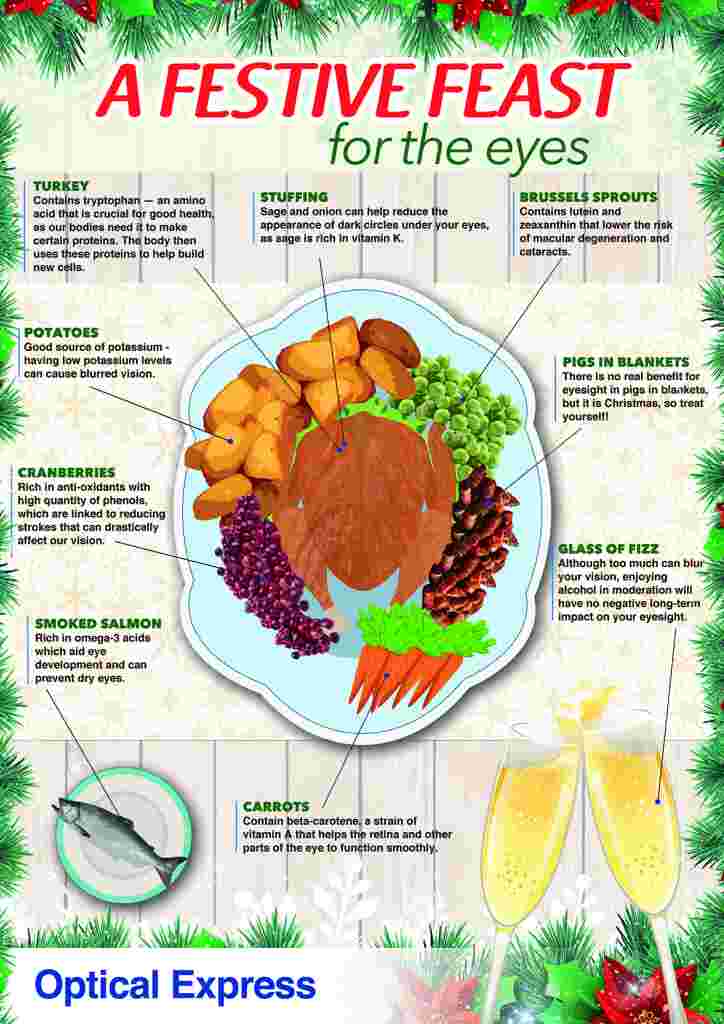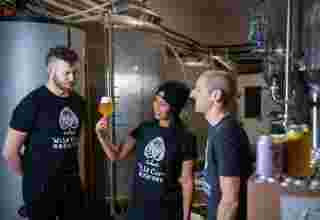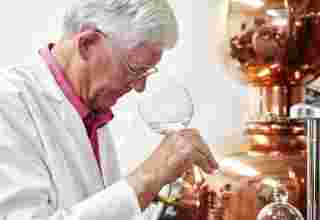For many, Christmas is a period of over-indulgence in rich food and one too many sherries, but yule never believe the impacts a traditional Christmas turkey dinner can have on our eyes. Optical Express’ UK Medical Director, David Teenan has revealed how your festive feast can impact your vision.
Turkey
The main event on the Christmas table, turkey, contains tryptophan which is an amino acid that is crucial for good general health. Our bodies require tryptophan to create certain proteins which, in turn, help to build new cells, maintaining the health of our eyes.
Stuffing
Swap the sausage stuffing for the healthier, and equally tasty, sage and onion alternative. Sage is rich in vitamin K which can help to reduce the appearance of bags under our eyes – particularly useful if you overdid it on the mulled wine on Christmas Eve.
Brussels sprouts
Love them or hate them, Brussels sprouts, like other leafy green vegetables, are excellent for our eyes. They contain lutein and zeaxanthin which lower the risk of developing macular degeneration and cataracts.
Potatoes
Boiled, mashed or roasted, potatoes and roast turkey go hand-in-hand. Low levels of potassium can cause blurred vision, but the humble spud is packed full of it, so help yourself to seconds.
Cranberries
Cranberries and cranberry sauce are packed full of anti-oxidants including a high quantity of phenols. The classic Christmas condiment is linked to reducing the chance of strokes which can drastically affect our vision.
Salmon
Like other oily fish, salmon is rich in omega-3 acids which aids eye development and can help to prevent dry eyes. If left untreated, dry eye symptoms can develop into conjunctivitis or, in rare cases, keratitis – which causes damage to the outer layer of the eye.
Carrots
Although the legend of carrots giving you night vision stems from World War II propaganda that British pilots eating lots of carrots were better able to fend off German bombers at night… there is some truth in it. Carrots contain beta-carotene, a strain of vitamin A that helps the retina and other parts of the eye to function efficiently, particularly in low light.
Glass of fizz
As well as long-term risks, a high alcohol intake can cause significant short-term problems for our vision. Alcohol reduces brain activity causing vision to fluctuate, impairing how we judge distances. It can also alter the physical appearance of our eyes. After heavy drinking eyes can turn red as blood vessels on the surface of our eyes dilate. However, alcohol in moderation will have no negative long-term impact on your eyesight.
Pigs in blankets
There are no real benefits or risks for our eyesight from pigs in blankets, but they’re delicious and it’s Christmas, we say treat yourself!
About Optical Express:
“It’s a wonderful world. We’ll help you see it that way.”
The Optical Express Group was founded in 1991 and is now a global leader of selected healthcare services.
Worldwide, Optical Express surgeons have together performed over 2 million refractive surgery procedures and their ophthalmic surgeons have a combined surgical experience of over 1,000 years. They treat more patients than all other laser eye surgery providers combined, as confirmed in the UK Government Competition Commission Report, November 2013.
In a recent survey of over 252,179 Optical Express patients, over 99% said they would recommend Optical Express to their family and friends.
In a study completed in September 2014 of nearly 336,381 Optical Express patients, over 99% achieved 20/20 vision or better following treatment.
The company employs over 2,000 people, utilising ophthalmologists and optometrists across more than 160 locations throughout the United Kingdom, Ireland, Croatia and Germany.




















